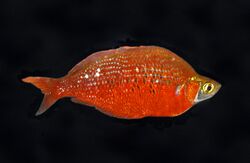Biology:Red rainbowfish
| Red rainbowfish | |
|---|---|

| |
| male | |
| Scientific classification | |
| Domain: | Eukaryota |
| Kingdom: | Animalia |
| Phylum: | Chordata |
| Class: | Actinopterygii |
| Order: | Atheriniformes |
| Family: | Melanotaeniidae |
| Genus: | Glossolepis |
| Species: | G. incisa
|
| Binomial name | |
| Glossolepis incisa M. C. W. Weber, 1907[2]
| |
The red rainbowfish or salmon-red rainbowfish (Glossolepis incisa) is a species of rainbowfish from Lake Sentani in Irian Jaya, Indonesia. Belonging to the family Melanotaeniidae, in the subfamily Melanotaeniinae, the Australian rainbowfishes.[1] It is threatened in its native range, but easily bred in captivity and common in the aquarium trade.[1]
Description
The males are bright red and with age grow a high back. The females are olive brown in colour. Their colours change depending on their mood, but subordinate males do not display bright colours. They grow up to 15 cm (5.9 in) in size, but typically attain a smaller size of around 12 cm (4.7 in).[3][4]
Breeding
They are an egg scattering species and they scatter their eggs among clumps of vegetation. The eggs take about 7 days to hatch.[4]
Nutrition
Glossolepis incisus is an omnivore and in captivity it will eat most common commercial aquarium foods readily. It may be slightly more carnivorous than most of the Australian rainbowfish.[4]
Conservation status
The IUCN Red List classifies Glossolepis incisa as endangered.[1] This is because of the rapidly increasing human population around this fish's only natural habitat and introduced species such as tilapia.[4]
Distribution
This species is endemic to Lake Sentani and its tributaries near Jayapura in Papua, Indonesia[1][4] (a range it shares with the related Chilatherina sentaniensis).
Taxonomy
Glossolepis incisa is the type species of the genus Glossolepis[5] and was described by Max C.W. Weber in 1907.[6] The name is virtually always misspelt as "incisus." However, the genus name (Glossolepis) is feminine, and the specific taxon must follow form.
References
- ↑ 1.0 1.1 1.2 1.3 1.4 Allen, G.R.; Kadarusman (2020). "Glossolepis incisus". IUCN Red List of Threatened Species 2020: e.T9268A147681075. doi:10.2305/IUCN.UK.2020-3.RLTS.T9268A147681075.en. https://www.iucnredlist.org/species/9268/147681075. Retrieved 20 November 2021.
- ↑ Weber, Max (1908). "Süsswasserfische von Neu-Guinea, ein Beitrag zur Frage nach dem früheren Zusammenhang von Neu-Guinea und Australien". in Wichmann, Arthur. Zoologie. Nova Guinea. 5 (2). Leiden: E. J. Brill. pp. 241–242. https://www.biodiversitylibrary.org/page/40348331. Pl. XI, Fig. 7a, b, c. (Desc.).
- ↑ Froese, Rainer and Pauly, Daniel, eds. (2019). "Golssolepis incisus" in FishBase. April 2019 version.
- ↑ 4.0 4.1 4.2 4.3 4.4 Red Rainbowfish Fact Sheet
- ↑ Eschmeyer, William N.; Fricke, Ron; van der Laan, Richard, eds. "Glossolepis incisus". California Academy of Sciences. http://researcharchive.calacademy.org/research/ichthyology/catalog/fishcatget.asp?genid=5461.
- ↑ Eschmeyer, William N.; Fricke, Ron; van der Laan, Richard, eds. "Glossolepis incisus". California Academy of Sciences. http://researcharchive.calacademy.org/research/ichthyology/catalog/fishcatget.asp?spid=14034.
Wikidata ☰ Q59066 entry
 |



